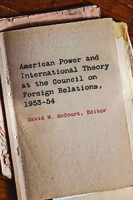American Power and International Theory at the Council on Foreign Relations, 1953-54
External Review of Whole Manuscript
| dc.contributor.author | McCourt, David M. | |
| dc.date.accessioned | 2020-01-14 10:57:34 | |
| dc.date.accessioned | 2020-04-01T09:15:28Z | |
| dc.date.available | 2020-04-01T09:15:28Z | |
| dc.date.issued | 2020 | |
| dc.identifier | 1006699 | |
| dc.identifier | 1006699 | |
| dc.identifier | OCN: 1133279319 | |
| dc.identifier.uri | http://library.oapen.org/handle/20.500.12657/23452 | |
| dc.description.abstract | Between December 1953 and June 1954, the elite think-tank the Council on Foreign Relations (CFR) joined prominent figures in International Relations, including Pennsylvania’s Robert Strausz-Hupé, Yale’s Arnold Wolfers, the Rockefeller Foundation’s William Thompson, government adviser Dorothy Fosdick, and nuclear strategist William Kaufmann. They spent seven meetings assessing approaches to world politics—from the “realist” theory of Hans Morgenthau to theories of imperialism of Karl Marx and V.I. Lenin—to discern basic elements of a theory of international relations. The study group’s materials are an indispensable window to the development of IR theory, illuminating the seeds of the theory-practice nexus in Cold War U.S. foreign policy. Historians of International Relations recently revised the standard narrative of the field’s origins, showing that IR witnessed a sharp turn to theoretical consideration of international politics beginning around 1950, and remained preoccupied with theory. Taking place in 1953–54, the CFR study group represents a vital snapshot of this shift This book situates the CFR study group in its historical and historiographical contexts, and offers a biographical analysis of the participants. It includes seven preparatory papers on diverse theoretical approaches, penned by former Berkeley political scientist George A. Lipsky, followed by the digest of discussions from the study group meetings. American Power and International Theory at the Council on Foreign Relations, 1953–54 offers new insights into the early development of IR as well as the thinking of prominent elites in the early years of the Cold War. | |
| dc.language | English | |
| dc.subject.classification | thema EDItEUR::J Society and Social Sciences::JP Politics and government | en_US |
| dc.subject.classification | thema EDItEUR::J Society and Social Sciences::JP Politics and government::JPS International relations::JPSD Diplomacy | en_US |
| dc.subject.other | diplomacy | |
| dc.subject.other | politics and government | |
| dc.subject.other | foreign relations | |
| dc.title | American Power and International Theory at the Council on Foreign Relations, 1953-54 | |
| dc.type | book | |
| oapen.identifier.doi | 10.3998/mpub.11301034 | |
| oapen.relation.isPublishedBy | e07ce9b5-7a46-4096-8f0c-bc1920e3d889 | |
| oapen.relation.isbn | 9780472131716 | |
| oapen.collection | Toward an Open Monograph Ecosystem (TOME) | |
| oapen.imprint | The University of Michigan Press | |
| oapen.pages | 311 | |
| oapen.place.publication | Ann Arbor | |
| peerreview.anonymity | Double-anonymised | |
| peerreview.id | d98bf225-990a-4ac4-acf4-fd7bf0dfb00c | |
| peerreview.open.review | No | |
| peerreview.publish.responsibility | Scientific or Editorial Board | |
| peerreview.review.decision | Yes | |
| peerreview.review.stage | Pre-publication | |
| peerreview.review.type | Full text | |
| peerreview.reviewer.type | External peer reviewer | |
| peerreview.title | External Review of Whole Manuscript | |
| oapen.review.comments | The proposal was selected by the acquisitions editor who invited a full manuscript. The full manuscript was reviewed by two external readers using a double-blind process. Based on the acquisitions editor recommendation, the external reviews, and their own analysis, the Executive Committee (Editorial Board) of U-M Press approved the project for publication. |

